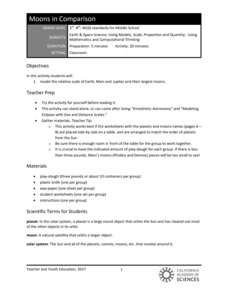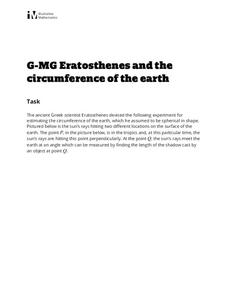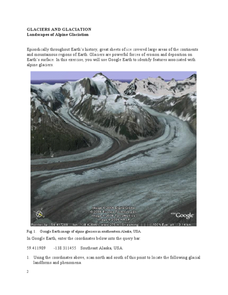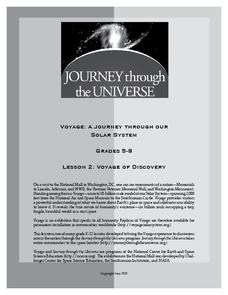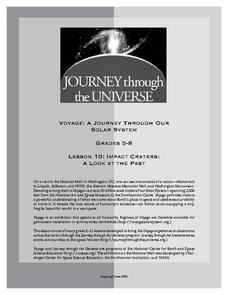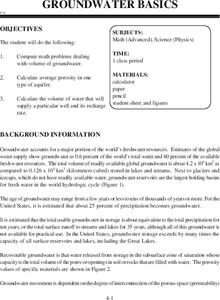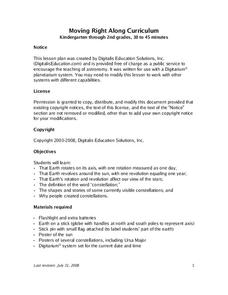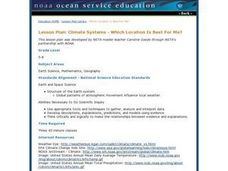T. Smith Publishing
Earth
Young astronomers read an informational text passage and then answer questions based on what they read.
Chicago Botanic Garden
Unit 3 Pre-Test, Grades 7–9
Earth's systems respond to changes in environments in all types of ways including migration, extinction, adaptation, immigration, and emigration to name a few. Part one in a series of seven is a pre-test consisting of 14 questions. Some...
McGraw Hill
Metric Units of Weight and Volume
Getting the right measurements can save a lot of time and money in the real world. Learners are introduced to unit conversion and how to accurately go from one unit to another. The first pages are notes and then the packet finishes with...
California Academy of Science
Moons in Comparison
Just how big is Earth's moon? With a hands-on simulation, scholars use Play-Doh to model the sizes of the planets Earth, Mars, Jupiter, and their moons. They make predictions as a class, work together to make their models, and discuss...
Lawrence Hall of Science
DIY Sun Science
Get an up-close-and personal look at the sun from the safety of your classroom with this fun science application. Offering numerous activities, images, and videos, the resource supports children of all ages as they learn about the sun.
NOAA
Tides
Sometimes low, sometimes high, but always in motion! Explore Earth's tidal system in the 10th interactive in a series of 13. Engaging life and earth science students alike, the versatile resource demonstrates cause and effect between...
Simply Worksheets
Solar System - Identifying Planets
In this space science worksheet, students read the five descriptions of various planets and match the description with the picture of the planet.
Curated OER
What is the Solar System?
Learners study the solar system. In this solar system lesson, students create graphic organizers, and participate in class demonstrations illustrating size and distance within the solar system.
Curated OER
GED Vocabulary: Earth and Space Science-Earth's Crust and The Solar System
In this earth and space science instructional activity, students complete a crossword puzzle given 9 clues and a word bank on topics such as sea floor spreading, tectonic plates, faults, lava and the big bang theory.
Curated OER
GED Vocabulary: Earth and Space Science
For this earth and space science worksheet, students complete a crossword puzzle given nine terms related to earthquakes, glaciers, the solar system, and sources of energy.
Curated OER
The Earth and Beyond
In this solar system worksheet, students complete 2 activities that involve ordering the nine planets and correctly placing them onto a diagram.
Curated OER
Fostering Geospatial Thinking: Space to Earth: Earth to Space (SEES)
Students locate and access data to help them with their science inquiry. In this geographical positioning lesson students evaluate and compare data sets.
Curated OER
Resources for Teaching about Biogeochemical Cycles
Students study the different cycles and Earth's systems. In this investigative lesson students study the nitrogen and carbon cycles, play a game pertaining to it and also participate in a class activity.
Curated OER
The Sun, Moon, and Stars
First graders will learn about the Earth's place in our solar system and its relationship to the sun, moon, and stars in this vibrant PowerPoint. The ten slides are full of great photographs to give students the full effect of each fact.
Curated OER
Living On Earth
Students discover the many different animals within various habitats and discover how each individual species interacts with its particular environment. Through charting different animals and their distinct habitat and matching animals...
NOAA
The Biogeochemical Cycle
The biogeochemical cycle ... no physics? The fourth installment of a 23-part NOAA Enrichment in Marine sciences and Oceanography (NEMO) program introduces the biogeochemical cycle by having pupils simulate movement between Earth's...
EduGAINs
Go H2O! Investigating Residential Water Systems
Before your learners excuse themselves to get a drink at the water fountain, prompt them to think about where that water comes from. A middle school science lesson encourages groups to research their community's source of drinking water,...
Illustrative Mathematics
Eratosthenes and the Circumference of the Earth
The class gets to practice being a mathematician in ancient Greece, performing geometric application problems in the way of Eratosthenes. After following the steps of the great mathematicians, they then compare the (surprisingly...
Curated OER
Landscapes of Alpine Glaciation
In this glaciers learning exercise, high schoolers use Google Earth to look for examples of different glacial landforms and phenomena. Students complete 2 short answer questions.
Journey Through the Universe
Voyage of Discovery
Did you know that Pluto is smaller than the United States of America? It is difficult to conceptualize the size of planets and the distance between them, and the lesson addresses those exact issues. After a discussion, pupils create...
Journey Through the Universe
Impact Craters: A Look at the Past
The Galle crater on Mars is also known as the Happy Face crater because of its appearance. First, scholars use pebbles and flour to simulate craters and study their properties. They then apply this knowledge to help decipher the history...
Curated OER
Groundwater Basics
Groundwater is an essential natural resource, not to mention a fascinating topic to study. Here is a series of twelve amazing lessons on the water source and how we use it in our daily lives. Concepts require higher math and physics...
Curated OER
Earth's Rotation
Students explore the Earth and its rotation. Volunteers model the sun-Earth system to demonstrate that the Earth rotates around the sun. In groups, students simulate "traveling" around the sun and discuss when it is night and day.
Curated OER
Climate Systems - Which Location Is Best For Me?
Learners study the difference between weather and climate. In this climate systems lesson students search the Internet for the parts of the Earth's system, gather climate data and complete a challenge scenario.
Other popular searches
- Earth System Origins
- 4 Major Earth Systems
- Moon Earth System
- Earth Systems Unit
- Major Earth Systems
- Earth Systems Interactions
- Sun Earth Moon System
- Earth Systems Global Winds
- Earth Systems 3209
- Earth Systems Science
- Earth Systems and Patterns
- Earth System Atmosphere





